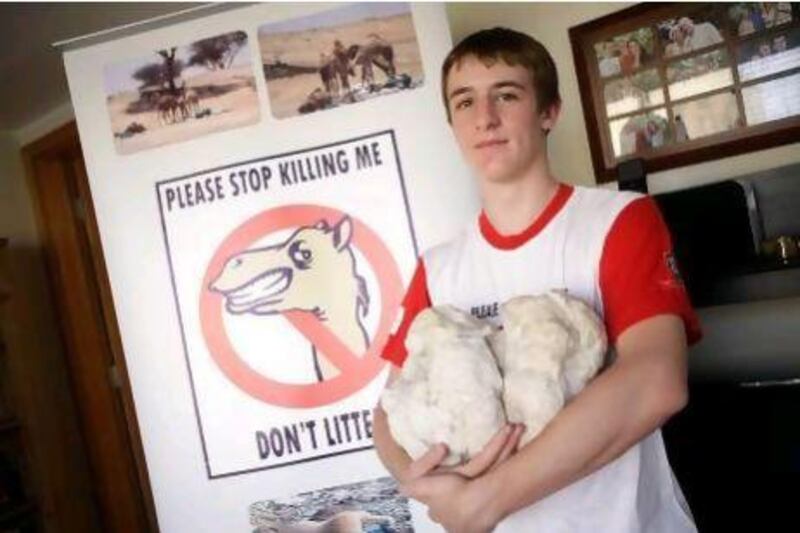DUBAI // A teenager is looking for sponsorship for his long-running campaign to protect camels and clean up the desert.
South African schoolboy Cameron Oliver, 16, was given an Abu Dhabi Award from Sheikh Mohammed bin Zayed, Crown Prince of Abu Dhabi and Deputy Supreme Commander of the Armed Forces, in 2008 for his idea, and is now looking for help to take it to the next level.
He aims to highlight how about half of all camel deaths in the wild are caused by the animals eating plastic discarded in the desert.
The campaign started in 2008 when Cameron was 11 and has mainly taken the form of clean-up trips to the desert, as well as educational talks at schools. In the year it launched, the youngster won the Abu Dhabi Award from Sheikh Mohammed.
"When I won the award, I promised Sheikh Mohammed I wouldn't stop until the camels stopped dying, and I intend to keep that promise," he said.
"I'd get the message out even further with sponsorship. I'd try to get billboards, advertising in malls, get my stickers on the back of taxis and on rubbish bins."
The campaign started as part of a school project. Cameron read about the issue of littering in the desert and went to discuss the issue with Dr Ulrich Wernery, the scientific director of the Central Veterinary Research Laboratory.
Dr Wernery had carried out extensive research showing how plastic accumulates in the stomachs of camels, calcifying into rock-like substances sometimes weighing as much as 50kg.
"I realised it was a serious issue and that I wanted to make this more than just a school project," said Cameron.
Dr Wernery remembers meeting Cameron for the first time. "He has done a wonderful job in the time since then," he said. "He has helped draw more attention to this issue."
The Austrian veterinarian said that about 30 to 40 per cent of dead camels the CVRL examine each year have plastic inside them.
"Despite all our efforts, we have not seen a big decline," he said. "Actually, it's quite the opposite.
"It will take time. I know I can't solve it in five minutes, but I will carry on, and I will work on it until my last breath."
He said it was not just camels who died from ingesting plastic. Endangered animals like the houbara, gazelles and even turtles have been poisoned by eating discarded plastic.
In previous years, it has been estimated that between 260kg and 840kg of rubbish per square kilometre is left behind at desert recreation sites in Fujairah and Hatta every week.
Cameron's father, Mark, said he was proud of his son's efforts. "This is an issue which he's taken to heart and we try to support him as much as we can," he said.
When he gets approval from his teachers at Al Yasmina school, Abu Dhabi, Cameron gives presentations to other pupils across the capital.
Cameron said his parents not only contribute to help presentations, they also pay for the thousands of stickers, T-shirts and baseball caps he prints with the campaign logo on and distributes for free at each event.
Because finances are tight, Cameron said that he would need financial sponsorship even just to maintain the campaign at current levels.
"It's a heavy load for my parents, so I'd just like a sponsor to help out with that," he said. "It's not about the money, but about getting the message out."





